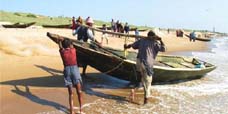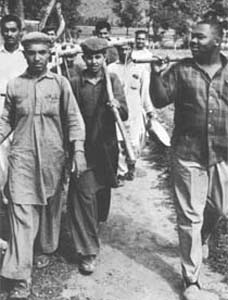
RPCV James Rupert writes: Pakistani women: A cruel repression
Pakistani women: A cruel repression
BY JAMES RUPERT
STAFF CORRESPONDENT
March 29, 2005
MULTAN, Pakistan -- Tabasum, an impoverished, illiterate folk singer, sat on the concrete rooftop where she lives these days and wept behind her veil as she told how six police officers raped her and her 18-year-old sister in May. The women were returning home from singing at a wedding, Tabasum said, when the men arrested them, hauled them to a house opposite the New Multan police station and raped them until dawn.
Tribal traditions in Pakistan dictate that a raped woman is "dishonored," cannot marry and so should be discarded, if not killed, by her family. Tabasum said she thought about suicide, the remedy for rape taken by many Pakistani women. But she is angry as well as humiliated.
"If these men are hanged, nobody else will do such things," said Tabasum, who, like many Pakistanis, uses one name. With help from human rights lawyers, she is trying to force a court to investigate the police in the rape.
Pakistani women, who human rights groups say face some of the world's cruelest repression, increasingly are resisting. In recent years, public activism has spread from a handful of educated elite women in the major cities to many in the middle class, and even a handful of poor and vulnerable women in villages and towns. But both in Pakistan and worldwide, women's rights activists say, their achievement in the past decade has been simply to turn what was a hidden issue into a public one. They lament that, for the most part, widespread talk about violence against women has failed to reduce it.
A galvanizing case
Women's activists here say the fragility of their campaign is underscored by turmoil this month in the country's biggest women's rights scandal -- the gang rape of Mukhtar Mai at the order of elders in her village southwest of Multan. Mai fled her home after an appeals court freed four of the six men convicted of the rape. Since then, the Supreme Court has had the men re-arrested and is considering the case, which often dominates the news in Pakistan.
Courts and the government of President Pervez Musharraf have taken steps to buttress some women's rights: to vote, run for office and marry men of their choice, for example. But actually enforcing those rights would push Musharraf into politically costly confrontations with Islamic fundamentalist parties and other conservatives, something he has avoided.
"Despite the many commitments made at the official level to act against 'honor' killings, domestic violence and other crimes against women ... realities for most women in the country remained unaltered" in 2004, said the latest annual report of the Human Rights Commission of Pakistan, an independent group. "Indeed there were indications an increased number faced violence ... with authorities failing to provide protection," it said.
Police often refuse to accept women's complaints of rape, activists say. In 670 rape cases noted by the commission in the first 10 months of last year, half of them gang-rapes, a total of 84 suspects were arrested, the report said. No data were available on how many were tried or convicted, but human rights monitors say it would have been a small percentage.
A feudal system
Men's treatment of women like property is nowhere more routine than in southern Punjab province, a flatland of vibrant green cotton and wheat fields dotted with mud brick villages. Here, a man controls the lives of his daughters or sisters, and often marries them off to other men to resolve debts, land disputes or family feuds.
"We have a saying that a woman is like a pair of shoes -- you can change her any time," said Rashid Rehman, a human rights lawyer in Multan, southern Punjab's main city.
Abusive men commonly kill or mutilate their wives on mere suspicion that the women might have "dishonored" them by speaking or meeting with another man. Attacks in which men use acid to disfigure a woman's face have been "growing alarmingly over the past three years ... most notably in southern Punjab," the human rights commission report said.
Rape rises in the cotton-picking season, when poor sharecroppers rely on a few months of hard field labor for the bulk of their annual earnings, said Asim Tanveer, a Multan-based journalist who has reported on such cases. Women among them can be summoned by a powerful landlord who will demand sex as the price for letting them remain on the farm, he said.
Pakistani men's power over women is enforced by traditions of tribe, clan and caste. Tribal elders, wealthy landlords and hereditary feudal lords form an elite class that normally rules the countryside, including the police force, far more than does any law established by the government. Among thousands of crimes against women, a few particularly dramatic cases draw public attention and intervention from Musharraf or other top officials. As in the case of Mukhtar Mai, only such outside intercession gives a woman a chance of winning a case in court, human rights activists and scholars say.
Pakistan's press is full of 200-word horror tales that make the news for a day, only to disappear. "A 15-year-old girl, resident of Usman Alishah village, daughter of a laborer, Mumtaz Ahmed, was abducted and gang raped by a group of landlords here," a state-owned news agency reported from Punjab last summer. "The raped girl has still not been recovered. ... The girl's parents, demanding justice, have threatened to commit self immolation in front of the ... [local police] office if the culprits are not caught and hanged for their despicable crime."
Mind control
For the most part, the greatest obstacle to women's rights is planted in their minds, said Tahir and Umi Kalsoom Seyal, a husband and wife who head a Punjab-based foundation that promotes rural education and women's rights. "When a girl grows up seeing her mother beaten, and her sisters married and sent away at the order of her father ... she learns nothing else but submission" to males, Tahir Seyal said.
Many men may show kindness and mercy to women in their charge, the Seyals said, but the notion of men and women as equals remains limited to a Westernized fringe of the elite. Especially in rural Pakistan, millions of women are taught never to complain about anything a man does and never to envision that they have a right to life or liberty, much less to the pursuit of happiness, according to the Seyals and others.
Pakistan's Islamic faith is made to cut both ways on women's issues.
Across much of Central and South Asia, male religious leaders who dominate in interpreting Islam often use the Quran's injunction that women dress modestly to enforce an all-enveloping "purdah," or isolation, of a woman from the world outside her immediate family. But women's rights advocates quote many of the same scriptural verses and note that women in the Quran, including a wife of the prophet Muhammad, had prominent public roles.
Several trends are prying open the psychological vise of tradition. Pakistan has the smallest percentage of female workers in South Asia, but the rate crept up from 5.4 percent of women in 1999 to 8 percent by 2003, and is thought still to be rising.
Satellite TV dishes, common in cities, are spreading slowly to prosperous homes in the countryside. The most popular programs are films from neighboring India that show women working outside the home, falling in love and battling for the right to marry as they choose.
While Musharraf's government has avoided direct confrontation with conservatives over women's rights, it passed a law in 2001 that gives women a third of seats on local councils and 22 percent of seats in provincial and national legislatures. Many localities, especially in Punjab and the North-West Frontier Province, have blocked, threatened or beaten female voters and candidates. In one local election last year, two female candidates disappeared, the Human Rights Commission of Pakistan reported.
Women say their presence in parliament has yielded few laws to protect them. In a political brawl last year, the government pushed through a bill to outlaw so-called honor killings, but human rights advocates said it leaves big loopholes that let men get away with murder by paying blood money.
Still, the presence of thousands of women in legislative offices has offered many Pakistani women their first direct access to the government. In Muzaffargarh, a district west of Multan, a woman managed to smuggle a note to local female council members saying she was being held prisoner by her parents for leaving her abusive husband. The councilors, one of them Umi Kalsoom Seyal, visited the home "and the woman was sitting in the courtyard with her ankles chained," Seyal said. The councilors summoned police, who freed the woman.
More than anyone, the person who has electrified the women's movement in Pakistan has been Mukhtar Mai. Elders of the Mastoi tribe, which dominates her village, ordered her gang-raped in 2002 in revenge for her brother's supposed affair with a Mastoi woman. The resulting uproar led Musharraf to order a quick trial.
Mai's decision to press charges against her attackers, despite threats of death from traditionalist men, "has begun to give women the courage to speak," said Umi Kalsoom Seyal. "They think that, if Mukhtar Mai can do this, why can't I do it?"
In Mai's village, Meerwala, the case has brought physical changes. Mai refused a government offer to move her out of her village and used compensation money she received to build the village's first schools: one for girls, one for boys.
So many official delegations and foreign visitors have trekked to Meerwala to meet Mai that the government paved the dirt road leading there. In mid-March, concrete poles stood waiting for cables that will bring electricity.
But "ideas here have begun to change only a little," Mai said in an interview. She still needs a police guard. She has visited hundreds of homes in Meerwala on what has become her mission: "I asked them, please send your daughters; I don't want to repeat this incident [the rape], so I want our girls literate. I want them to know their rights." Many of her neighbors "asked me, what will girls do with this knowledge?" she said. About 200 girls now study at Mai's school, including a daughter of one of the men convicted of raping her.
Mai's status as the icon of Pakistan's women's struggle now fills her days. She is learning to read and write. She teaches sewing at her school, meets with dignitaries who come to offer support and with women from neighboring villages who come to her with reports of abuse. She has rejected numerous offers of marriage, saying she cannot be sure she is not now sought for her fame and her access to money.
On the day this month that the convicted men returned to the village, freed by an appeals court, Mai seemed emotionally empty. "Before the criminals were freed, I thought I had the chance to change something," she said. "Now I can't see any chance."
A few miles away, hundreds of men crowded into the courtyard of Faiz Bakhsh Mastoi to congratulate him and his fellow convicts. Even there, Meerwala was divided by the rape case. Two Mastoi tribesmen sought out visiting journalists to whisper warnings. "For these men, rape is nothing," said one dissenter. "You've come about one case, but there are hundreds more like it."
In a few days' visit to southern Punjab, stories of rape emerged at every stop. In the village of Dirpur, Jaafar Hussein Bhutta, principal of a secondary school, pulled journalists in to meet his 18-year-old wife. In January, after Bhutta slapped a student at the school over his poor performance on an exam, the youth and three of his friends gang-raped Bhutta's wife.
Medical evidence confirmed the rape, and after intercession by politicians from Islamabad, the case is in court. But the student's family is rich and powerful, local people said, and they have a good chance of bribing their way out of a conviction. In case they don't, Bhutta said, they have threatened to kill him.
In New Multan, where the six policemen are accused of raping Tabasum, the folk singer, police have resisted an investigation at every stage, said Shahzeb Khan Afshar, a human rights lawyer who is representing Tabasum without pay. They rejected her initial complaint as well as Afshar's request that officers at the New Multan station be tested against DNA samples from the rapists' semen.
Police say that, to the contrary, they have solved the case. While Tabasum, her sister and her mother say it was policemen who abducted the two younger women, the rickshaw driver who was driving them that night supports the police account that no officers were involved. Two local merchants have been arrested and face trial.
The intense publicity and government support for Mukhtar Mai let her escape some of the traditional rejection that society here pours on rape victims. So far, Tabasum is not as lucky. Her case has gotten less attention, and "everyone -- the judiciary and the police -- has been doing all possible to protect the policemen in this case," Afshar said.
While hoping for justice, Tabasum is living as anonymously as she can in Multan's congested old city. Twice she has moved, at least once, neighbors said, because police pressed her landlord to kick her out. She no longer sings at weddings and survives by scrubbing clothes for a family that doesn't know about the rape case.
Of the policemen, she said, "We pray to God that they die like dogs. We cannot face the community otherwise."














